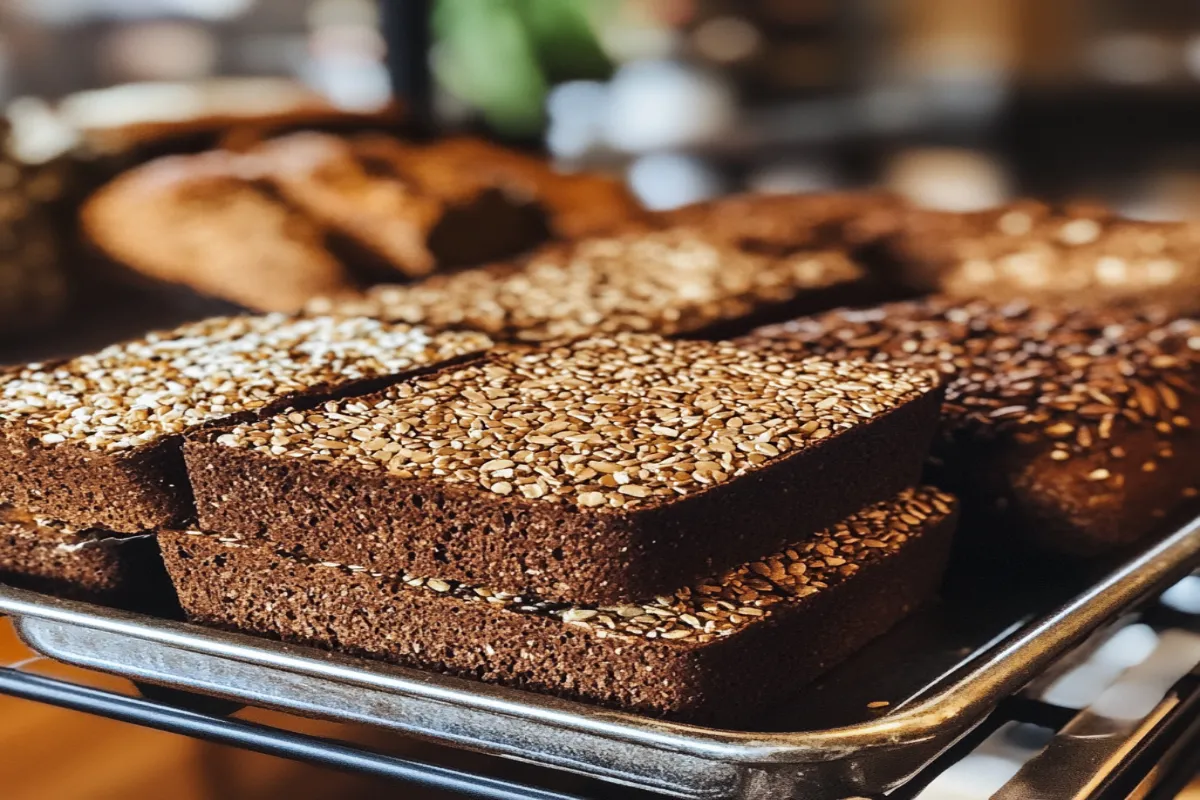Ezekiel bread has gained significant popularity among health enthusiasts due to its unique ingredients and the health benefits it claims. Unlike regular bread, Ezekiel bread is made from sprouted whole grains and legumes, which makes it different from other breads. In this article, we explore whether it is healthy to eat Ezekiel bread every day and what the potential benefits and drawbacks are. For those wondering, ‘is it healthy to eat Ezekiel bread every day?’, we provide a detailed analysis to answer this question comprehensively.
What is Ezekiel Bread?

Ezekiel bread is inspired by an ancient recipe mentioned in the Bible, specifically in Ezekiel 4:9. It contains a blend of sprouted grains, legumes, and no added sugar, which makes it stand out compared to traditional bread options. The ingredients typically include wheat, barley, spelt, lentils, and millet, all of which are sprouted before baking. This unique process enhances the nutritional content and makes it easier to digest.
Compared to traditional breads, Ezekiel bread is higher in nutrients and has no added preservatives or artificial ingredients, which leads many to ask, ‘is it healthy to eat Ezekiel bread every day?’. It offers a natural, whole-grain alternative that provides multiple health benefits.
For those interested in understanding why whole grains are an essential part of a healthy diet, the Benefits of whole grains from Harvard T.H. Chan School of Public Health provides valuable insights.
Nutritional Profile of Ezekiel Bread
The nutritional profile of Ezekiel bread is one of its major selling points, making many people question ‘is it healthy to eat Ezekiel bread every day?’. It is rich in fiber, protein, and essential vitamins and minerals. Unlike refined white bread, which is stripped of most nutrients during processing, Ezekiel bread retains the natural goodness of whole grains and legumes.
- Fiber: High fiber content promotes digestive health and helps maintain healthy blood sugar levels.
- Protein: Ezekiel bread is also a good source of plant-based protein, containing all nine essential amino acids, making it a complete protein.
- Vitamins and Minerals: It is rich in B vitamins, iron, magnesium, and other micronutrients.
Additionally, because it is made from sprouted grains, the nutrients are more bioavailable, which means they are easier for the body to absorb and utilize effectively. For more information on the benefits of low glycemic index foods, refer to the Understanding the glycemic index by the American Diabetes Association.
Health Benefits of Eating Ezekiel Bread Daily

- 4.1. Rich in Nutrients Ezekiel bread is packed with vitamins, minerals, and amino acids, making it an excellent addition to a balanced diet. The sprouting process enhances the bioavailability of these nutrients, which is beneficial for overall health.
- 4.2. High Fiber Content The high fiber content in Ezekiel bread helps support gut health and improves digestive function. Fiber is known to prevent constipation, lower cholesterol levels, and keep you feeling full for longer, which can be helpful for weight management.
- 4.3. Low Glycemic Index Ezekiel bread has a low glycemic index, which means it causes a slower rise in blood sugar levels. This makes it a suitable choice for people looking to manage their blood sugar, including those with diabetes.
- 4.4. Complete Protein Source Since Ezekiel bread contains all nine essential amino acids, it is considered a complete protein. This makes it a particularly good option for vegetarians and vegans who may need additional sources of protein in their diet.
Possible Drawbacks or Concerns
- 5.1. Allergens and Gluten Content One significant concern is the presence of gluten. Ezekiel bread is not gluten-free, which makes it unsuitable for people with celiac disease or severe gluten sensitivities. The ingredients include wheat and barley, both of which contain gluten, posing a problem for those with gluten-related health issues.
- 5.2. High in Carbs While Ezekiel bread is rich in nutrients, it is also relatively high in carbohydrates. This could be a concern for those on a low-carb or keto diet. If you are monitoring your carb intake, you may want to limit the amount of Ezekiel bread you consume.
- 5.3. Cost and Accessibility Ezekiel bread is often more expensive than traditional bread due to the quality of ingredients and the sprouting process. Additionally, it may not be as widely available in all grocery stores, making it less convenient for some consumers.
Scientific Evidence on Health Effects
There are several studies and expert opinions supporting the health benefits of sprouted grain bread, like Ezekiel bread. Research indicates that sprouted grains may have a lower glycemic response and are easier to digest compared to non-sprouted grains. Nutritionists agree that the sprouting process can improve nutrient absorption and support overall digestive health. Regular consumption of Ezekiel bread can thus be a healthy choice for many people, provided they do not have gluten intolerance.
How to Incorporate Ezekiel Bread into Your Diet
Incorporating Ezekiel bread into your daily diet can be simple and rewarding. Here are some suggestions:

- Breakfast: Use Ezekiel bread as a base for avocado toast, or serve it with eggs for a protein-packed breakfast.
- Lunch: Make a sandwich with lean proteins, fresh vegetables, and Ezekiel bread for a nutritious lunch.
- Snacks: Toast a slice and top it with nut butter and banana slices for a healthy afternoon snack.
Daily Consumption, Alternatives, FAQs & Conclusion
Is It Safe to Eat Ezekiel Bread Every Day?
For most people, eating Ezekiel bread daily is safe and beneficial. Its rich nutrient profile makes it an excellent option for maintaining a healthy diet. However, those with gluten sensitivities or specific dietary restrictions should be cautious. The high fiber and complete protein content make it ideal for those looking to improve their digestive health and overall nutrition.
Long-term consumption of Ezekiel bread can contribute to better health outcomes, provided it is part of a balanced diet that includes other nutrient-rich foods. This raises the question, ‘is it healthy to eat Ezekiel bread every day?’.
Who Should Avoid Eating Ezekiel Bread Daily?
- 9.1. People with Celiac Disease or Gluten Sensitivity Since Ezekiel bread contains gluten, it is unsuitable for individuals with celiac disease or gluten sensitivities. Even though sprouting can make grains easier to digest, it does not remove gluten.
- 9.2. Those on Specific Diets Ezekiel bread is also not suitable for those on a low-carb or keto diet, as it contains a significant amount of carbohydrates. It may also not be ideal for individuals following strict paleo diets.
Best Alternatives to Ezekiel Bread
If Ezekiel bread isn’t suitable for you, there are several healthy alternatives available:
- Gluten-Free Bread: Made with almond flour, coconut flour, or rice flour for those with gluten intolerance.
- Sourdough Bread: The fermentation process helps reduce gluten content, making it easier to digest.
- Low-Carb Bread: Options such as cloud bread or bread made with almond flour can be ideal for low-carb diets.
FAQ Section
- 11.1. Is Ezekiel bread gluten-free? No, Ezekiel bread is not gluten-free. It contains wheat, barley, and spelt, all of which are sources of gluten. Therefore, it is not suitable for those with celiac disease or severe gluten sensitivities.
- 11.2. Can diabetics eat Ezekiel bread every day? Yes, diabetics can benefit from Ezekiel bread as it has a low glycemic index. This means it has a slower impact on blood sugar levels compared to regular bread. However, portion control is essential, and it is always best to consult with a healthcare provider.
- 11.3. What makes Ezekiel bread healthier than regular bread? The main reasons are the sprouting process, higher nutritional content, and absence of added sugars and preservatives. Ezekiel bread also contains a higher level of fiber, which aids in digestion and provides sustained energy.
- 11.4. How much Ezekiel bread should I eat per day? For most people, 1-2 slices of Ezekiel bread per day is a healthy amount. This can provide essential nutrients without going overboard on calories or carbohydrates.
Conclusion
In conclusion, Ezekiel bread is a highly nutritious option that can be eaten daily by many people. Its benefits include high fiber, complete protein, and numerous vitamins and minerals that support overall health. However, it is not suitable for those with gluten intolerance or specific dietary restrictions. For anyone looking for a nutritious, plant-based bread option, Ezekiel bread is worth considering as part of a balanced diet.

